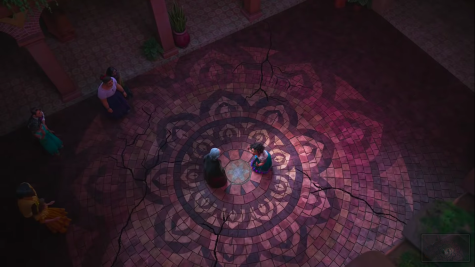Let’s Talk About Bruno
An Inside Look in the Family Madrigal
Every family has secrets, and family secrets run deep. From generation to generation, vague and faint discussions only take place in whispers by the family’s elders and spoken in hushed, reverent tones when necessary.
Disney’s newest animated film, Encanto, highlights a family reopening a family secret in an entire lyrical masterpiece that is now sitting at second place on Billboard’s Hot 100 this week, composed and written by Lin-Manuel Miranda, called “We Don’t Talk About Bruno.”

The entire rhythmic soundtrack of the movie immerses it’s audience in 20th century, rural Colombia. Illustrated with vibrant colors and memorizing sights of Latin American culture, the animated film takes its audience on a journey, testing the strength of family relationships by exploring the traumatic roots of familial expectation and pressure.
Grace Abdayem ‘23 said, “I think the reason Encanto resonates with so many people is because we know these family dynamics and it’s really liberating to see them expressed on screen. Being a first generation immigrant is a very alienating experience, as you have to balance the expectations to do everything your parents weren’t able to accomplish due to their circumstances while also just trying to grow up in a world that is very different from your home.”
Many of those who are first and second generation really resonate with this movie’s portrayal of generational trauma and how it seeps into the family dynamic of an immigrant family.
In the opening song, “The Family Madrigal,” the main protagonist, Maribel Madrigal introduces each member of her family and their role in the community. Abuela Alma Madrigal sits at the top of the family tree as the matriarch of the Madrigals as she is the one who built the village and community they now live in.
Colombia’s violent history during the 1800-1900s hints that innocent people, like Abuela’s fictional character, had to flee to the countryside in order to escape corruption, persecution, and harm from the country’s government leaders. In Abuela’s backstory, she too had to flee her home with her husband after it was set on fire.
As seen in a flashback Abuela is seen with her husband, leading the way for the townspeople to find a new and safe place to start over; however, she witnesses her husband approach Colombian authority that arrived armed, on horseback, murdering the love of her life.

Now widowed, with her three children and a heavy heart, Abuela falls to her knees desperate and a miracle finds her. From then on, the children with Madrigal blood will gain a gift on their fifth birthday meant to help the community and keep the miracle candle that cultivates the magic burning.
But with great magic comes immense pressure and expectation. In contrast to western ideology that praises the individual, Latin American culture emphasizes the importance of the common good and working together as a community, as a family. Throughout the movie, the gifted Madrigals are seen working left and right to keep up with the expectations of the town and especially the expectations of Abuela.
In fear of losing the magic, Abuela demands perfection in her high expectations that have become more like inarguable demands. Perfect Isabella, Maribel’s oldest sister, is a representation of what Abuela wants the family to achieve. Although initially seeming vain as the “golden child,” we later learn that Isabella has no opinion or say in who or what she does. She is limited in what she can do with her gift and even admits to agreeing to marry the man Abeula wants her to marry only out of expectation.
“As a first generation and the oldest of three, I relate to Isabella and the overwhelming expectations of having to set an example for your younger siblings. Having to set the bar for them is tricky when the bar is already so high for me. I did enjoy Encanto’s portrayal of that.. Oh! And its soundtrack, that’s something my siblings and I are on the same page about as we sing along to the soundtrack together,” said Keana Ravello ‘22.
Abuela’s survivor’s guilt has been projected into her expectations of her children and then passed on to her grandchildren creating the vicious cycle known as generational trauma. Since the kids receive their gift at the age of five, the children within the Family Madrigal learn at an early age their role of service to the townspeople. The town relies on their gifts and although there is love and community flowing within the village they have created, that responsibility becomes the priority, blurring the line that separates their identities and their gifts.
With tension growing within the family with all the unspoken expectations, impossible standards and secrets brushed aside, the relationship between the giftless protagonist and Abuela becomes rocky. Without a gift, Maribel feels like Abeula doesn’t value her as she cannot serve the town or contribute to the family in the way the other members do.
In trying to find out the truth about the biggest secret in the Family Madrigal (what happened to her Tìo Bruno) and figuring out her identity without a gift, Maribel confronts the family’s secrets and the weight of Abuela’s expectations.

Through song, color and the message of family, resolution is found when Abuela takes accountability for her own mistakes and reassures the children that they are more than their gift, that “the gift is you.”
It is important to remember, especially within an immigrant family, that generational trauma runs deep. Many of the older generations were not taught and therefore are not equipped with the skills it takes to emotionally and mentally confront and communicate the root of their expectations and feelings; however, it is a long and difficult journey that is worth embarking on.
As pressure to fulfill expectations and a certain reputation, we can get so caught up in wanting to “shine” like the stars, but in the words of the Madrigals in the musical composition All Of You, “Stars don’t shine. They burn. I see how bright you burn… the miracle is not some magic that you’ve got. The miracle is you, not some gift, just you.”
